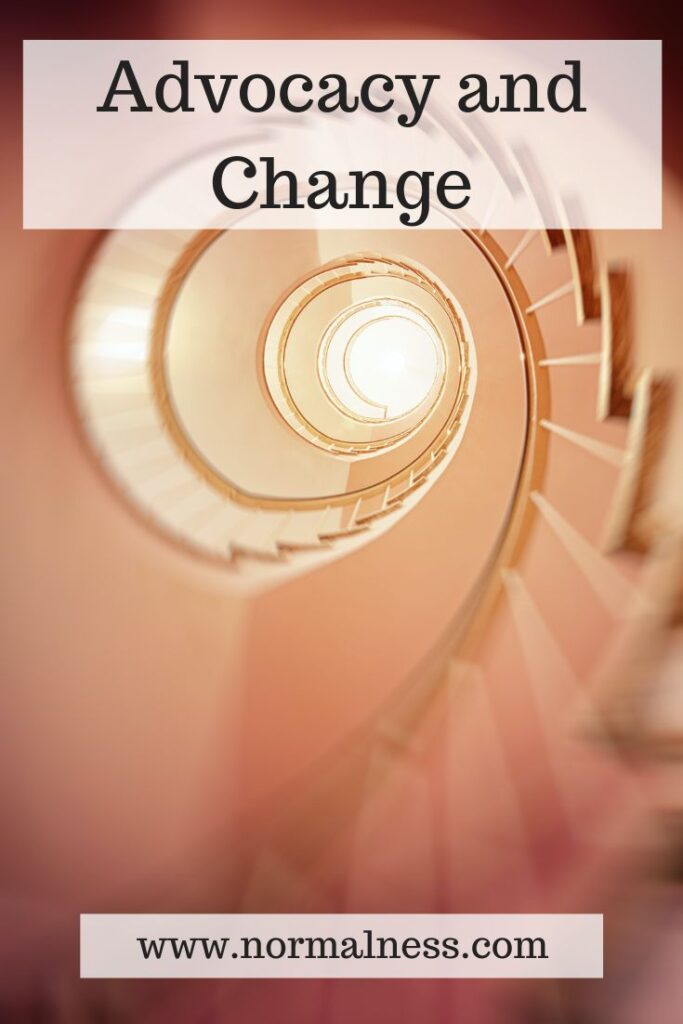Note: all definitions below are based on my perception.
I’ve always wanted systemic change.
If a company does something wrong and then apologises to me, I’m not really interested in the apology. What I want to happen is for them to change their systems so that it doesn’t happen to anyone else. Only then is a problem fixed.
This is why it’s hard to call myself a self advocate.
Advocacy
Self advocacy is basically standing up for yourself. There are probably fancier and more complex definitions but this one works fine. People may or may not know you do this. It may happen only in private.
It is worth noting that most non assholey (technical term) advocates recognise the value of self advocacy because anyone standing up for themselves tends to have a positive cumulative effect on change.
Advocacy as a broader term tends to mean a combination of standing up for lots of people, getting things (e.g. systems) changed for others, and usually doing so publicly (on your own or part of a group/community/association).
You can see where my experience is conflicting, can’t you?
The Clusterfuck
Let’s take the clusterfuck that has been employment since I became mostly housebound.
I advocate for myself. It doesn’t always help me but my willingness to tell a recruiter or HR person that their actions towards me are discriminatory may help them think twice about being such an obvious cunt to others in the future.
(I’m thinking of you, obvious cunt, dear recruiter, who told me that if I’m housebound I am only deserving of entry level customer service roles.)
Standing up for yourself doesn’t come without negatives. I hesitate to use the words consequences or repercussions as I feel people interpret them as implying you deserve what happens to you.
You do not deserve negative outcomes for standing up for yourself and what are basic fucking rights:
- autonomy
- equality of opportunity
- non discrimination
- participation and inclusion in society
To name just a few… From the United Nations Convention on the rights of Person with Disabilities …which FYI Australia is a signatory.
Slicing me up
But let’s face it, when there’s no punishment for those in power who flagrantly ignore human rights, stab ends up on the person with the least power. The person challenging the discriminatory status quo.
Sometimes you become a bit numb to these stabs. It’s like “ugh, yeah, another paper cut, so annoying”.
And then comes the cumulative trauma.
The dozens of recruiters who won’t get back to me when I send them an updated resume that reminds them I’m housebound and my main disability accomodation requirement is full working from home.
The recruiters who refuse to ask their client if they will “permit” the job to be done from home, telling me to do work (a big application) and “seeing” after that if the employer will permit my disabled existence in their company.
But through this, all anyone sees is the individual (metaphorical) paper cut. The one instance they were a discriminatory jerk to me.
This places my “reaction” as “bad” or “too much”.
I could be bleeding out from a million paper cuts and all they’ll acknowledge is the single one they caused, and they’ll tell me I’m too much. It’s not that much blood from one paper cut!
I’ve always been bad at playing social games of the “right” levels of interest, enthusiasm etc. Ever since my health got worse, and I got treated worse because of that, I’ve realised I give exactly zero shits in determining the “right” levels of interest, enthusiasm … and how people think a disabled person “should” behave.
Hint: in this context, the “right” level is making sure the non disabled persons ego isn’t hurt, and suggesting they are discriminatory hurts that ego greatly.
People interpret a challenge as a negative. It’s pretty ironic given I’m using examples of recruitment, where your “fault” is expected to be “I try too hard”. I guess it’s only the employee that has to twist “negatives” into “positives”, employers just get to be shit with no accountability or pressure to improve.
So…what am I?
I’m somewhere in the murky land between a self advocate and an advocate. As per usual, I don’t fit neatly into a box. The actions I take fit one category (self advocacy) and the outcomes I want fit the other (systemic change).
What is my future?
I don’t know. I’m struggling. My day job is fully remote but in a genuine way, they’re not going to suddenly turn around and ask me to un-disable myself for them. (Yes, that is a common expectation, e.g. “Oh but you can come into the office for training, right?”. Um, no. I’m not housebound only for certain reasons, the reason for leaving the house is not a variable on my functioning levels.)
Part time isn’t paying my bills though. As I say at the end of this post, the only long term way forward I can see for myself is to remove myself from broken systems. I need to work with my needs.
I need to be richer so I’m not squashed under systems that don’t believe that energy impairment exists. Some wonderful posts on energy impairments: here and here and here and here. Basically, follow Charlie. Most current (non psychological) research on ME/CFS, long covid etc is showing that our cells do not use/produce energy properly. It can’t be fixed with willpower. “Pushing through” has a high likelihood of making you so sick you can’t digest food. And you pretty much get left to die at that point. I’m lucky. I can mostly do things ok, so long as I can do it on my terms/in my own time.
I’d like the world to pull its collective head out of its collective ass and realise energy impairment is real. I think that’s a main reason I got rejected from that job I was the best candidate for. They don’t see accomodating a lack of energy as a need, only a want. I need to remove myself from systems that view me that way because it fucking hurts.
If you like my posts, consider supporting me.






Things like these are so important to advocate for. I read the post you linked to. A friend of mine suffered CFS after having glandular fever years ago. She was so sick for such a long time, was ok but then got Covid and things went haywire.
In my opinion, for jobs that can be done at home there is no excuse for refusing people to work from home or discriminating against people who for whatever reason want to work from home. Covid taught us it’s possible and that many people are more productive doing it too.
ME/CFS are such awful diseases. So sorry to hear about your issues. 🙁
If ever there was someone who ‘pushed through’ it was, as I observed through your updates before long covid it was you.
As you and I have ‘chatted’ from time to time. I still have no answers and it’s pretty obvious employers have a rigid mindset these days.
I hope, over time, you can be better paid to enable you to stay where you are now as I know the place is suitable for you and B.
I always appreciate your linking up to #WWandPics this week and thanks for sharing your post. I hope to see you next Wednesday too. Warm wishes, Denyse.
So sorry you have such a lot to deal with but very glad you are self advocating and advocating for others so they don’t have to go through the same stuff! Hope everything works out well for you!